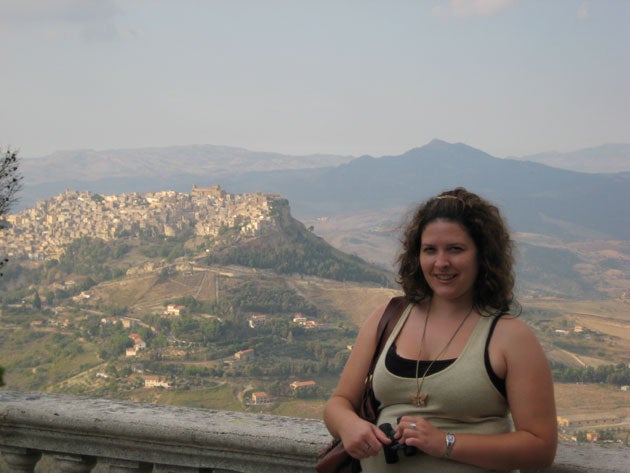Wealth Check: 'I don't know if I will have enough money to retire on'

Samantha Potter, 31, a geophysicist from Warrington, divides her time between her job on board a ship, her partner in China, and her friends and family in the UK. She has no rent or utilities bills to pay, but is concerned about her long term savings. "I don't know whether I will have enough money to retire on," Samantha says. "I don't know what my options are apart from my pension, I also don't own a property in the UK, and don't know if I should invest in a buy to let."
Case notes
Samantha Potter, 31, Warrington
Income: Samantha earns £37,000 a year, plus a bonus of for every day she spends at sea. And because she spends six months of the year at sea, she gets up to £7,000 in tax rebates.
Monthly spending: Samantha spends around £100 a month on her mobile phone, £300 on food, and £112 on storage costs.
Savings: She puts £200 a month into a cash ISA
Pension: £70 a month.
Debts: A £17,000 student loan.
Three independent financial advisers offer Samantha their help this week: Dennis Hall of Yellowtail Financial Planning, Danny Cox of Hargreaves Lansdown and Martin Bamford from Informed Choice.
Pension
Samantha wants to retire early, at 50 or 55, on an income of around £20,000 in today's money. But if she has any hope of achieving that her pension will need a lot of attention, all three advisers warn. "Sam's pension is woefully short," says Hall. "She will really need to ramp up her savings to ensure that she accumulates enough to provide her with the level of income she wants. Her retirement fund will need to be around £500,000 for that level of income."
"If Samantha continues to pay into her pension at the current level of £70 a month, her pension fund will be around £180,000 at 55," adds Cox. "But that will only give her a pension income of £3,544 in today's terms. Even if she doubled her contributions to £140, her pension might only be worth £236,000, which will give her £4,620 a year."
Samantha admits that she doesn't really understand how her pension works, but Bamford says that should be a priority. "This might be money locked away in a tax efficient wrapper for her retirement income, but it's still her money," he says. "She needs to understand how it is invested and what benefits it can provide."
Sam's pension plan is currently invested a fund that invests half her money in UK companies and half in international ones.
"At 31, Samantha has a long time to go to retirement so having her money invested in equities is not a bad idea [as she has time for her fund performance to even out the short-term volatility of the market]," says Bamford. "But she should look at diversifying her pension fund to include some fixed interest and commercial property funds."
It is also important that Samantha contacts the Pension Service (on 0845 60 60 265) to find out if her tax rebates reduce her State Second Pension entitlement.
Get a free fractional share worth up to £100.
Capital at risk.
Terms and conditions apply.
ADVERTISEMENT
Get a free fractional share worth up to £100.
Capital at risk.
Terms and conditions apply.
ADVERTISEMENT
Property
"The state of the housing market is playing into Sam's hands," says Hall. "But she should not be in too much of a rush to take on such a commitment. By the time she has built a decent deposit, property prices may have become considerably cheaper. I think the market will be depressed for at least two or three more years."
But if Samantha wants to use a buy to let property as part of her income later in life, she needs to be realistic, Cox warns. "A typical yield for a rental property investment is around 4 per cent. To give Samantha an income of £20,000, she would have to own £500,000 worth of property with no mortgage," he says.
"Even that assumes full occupancy, and does not account for management or maintenance fees. For £20,000 of income, Samantha would probably have to own £750,000 worth of property outright." And tax is often forgotten. The income from a property is subject to tax and when that property is sold the sum is subject to capital gains tax at 18 per cent.
Savings & Investment
"Samantha should save as much as she can into the cash component of an ISA each year – a maximum of £3,600," advises Cox. "Both Barclays and Birmingham Midshires are currently paying 6 per cent on their cash ISAs."
For emergency cash, Samantha should build up a fund worth between three and six months of her salary. "There are a number of instant access accounts paying 6 per cent and more," he adds. These include Bradford and Bingley and Intelligent Finance. Samantha should also be confident of her employee benefits if she becomes ill for a long time.
Debts
Sam's debts are large, but at 2.4 per cent, the interest charged on them is very competitive. "While Samantha is able to earn more interest in savings than she pays in debts, it makes sense to eke this loan out as long as possible," suggests Hall. "But it remains a debt and she should continue to chip away at it, especially as it may restrict the amount she could borrow when she wants to buy her first property."
To find an independent financial adviser in your area, visit www.unbiased.co.uk
Join our commenting forum
Join thought-provoking conversations, follow other Independent readers and see their replies
Comments
Bookmark popover
Removed from bookmarks